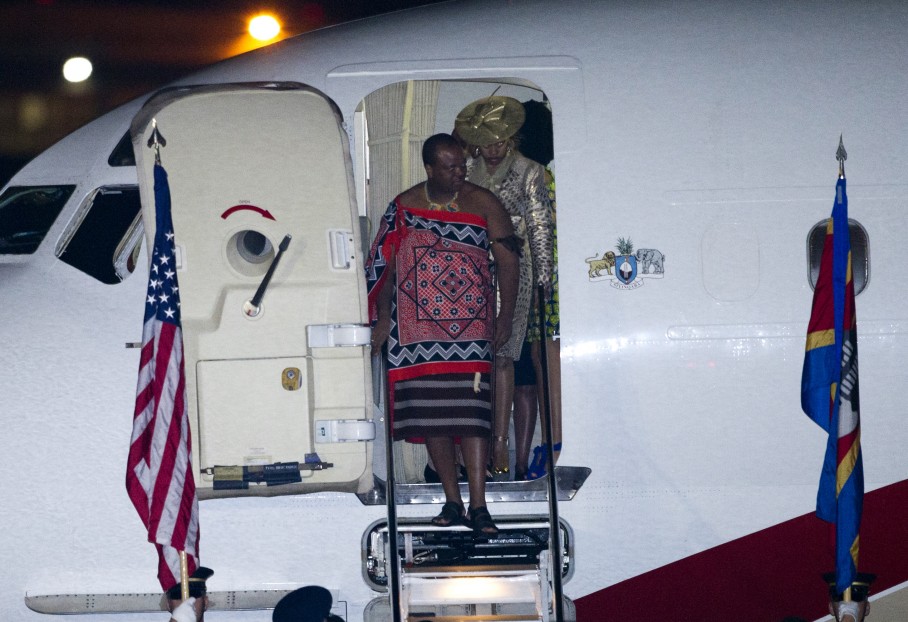By Rick Noack

King Mswati III of Swaziland and Queen Inkhosikati LaMbikiza arrive at Andrews Air Force Base on Aug. 3 to attend the U.S.-Africa Leaders Summit. (Cliff Owen/AP)
It is an exceptional event, even measured by Washington’s standards. This week, more than 50 African leaders will unite in the U.S. capital to discuss delicate issues such as gay rights, the Ebola outbreak and terrorism. While the topic agenda is full, the guest list of the U.S.-Africa Leaders Summit has some notable blank spots. For example, the leaders of Liberia and Sierra Leone will skip the summit to handle the Ebola outbreak that is causing a large number of casualties in western Africa.
Other leaders, however, were not even invited. Here’s a brief rundown of the personae non gratae:
Zimbabwe
When Zimbabwe became an independent country in 1980, a promising future seemed to lie ahead. Today, Zimbabwe ranks at the bottom of the same statistics it once led among sub-Saharan nations. For years the U.S. has led an international effort to impose sanctions against the African nation, and Human Rights Watch as well as Amnesty International have heavily criticized rights abuses and forced evictions. Zimbabwe’s authoritarian leader Robert Mugabe is now pursuing a “Look East Policy” to make up for the sanctions imposed from the West and earns the praise of countries such as Iran.
Sudan
Rattled by a seemingly endless series of crises, Sudan has struggled for decades. The deterioration of U.S.-Sudanese relations is mainly due to the Darfur conflict, which prompted U.S. sanctions in 1997 and 2007. But President Omar al-Bashir’s government has also been criticized for not being able to resolve a long-standing divide which led to the independence of South Sudan in 2011.
Central African Republic (CAR)
Since 2013, scores have been killed in sectarian tensions in the country and thousands have been forced to flee. The situation has become so threatening that France decided to send forces to its former colony. The State Department cites “concerns over the pace of political and economic liberalization and human rights” that have strained U.S.-CAR relations. President Catherine Samba-Panza has only been in office since January, a tenure that has been too short to assess her impact on the country.
Eritrea
With no functioning judiciary, Eritrea ranks among the world’s most closed countries. Arbitrary torture and restrictions on free expression most certainly contributed to the fact that Eritrea’s President Isaias Afewerki was not invited to Washington this week, as well as accusations of destabilizing Somalia and his rejection of a U.S. ambassador.
Western Sahara
The area is difficult for diplomats because Morocco claims sovereignty over western Sahara but controls only parts of it. The White House presumably tried to avoid that conflict in a summit that is already filled with problematic topics. Although western Sahara is mainly controlled by Morocco, the Polisario Front has proclaimed the sovereignty of the Sahrawi Arab Democratic Republic. However, its president, Mohamed Abdelaziz, has a hard time convincing fellow leaders of his country’s existence.
The reasons why the White House refrained from inviting some of these leaders are clear. But being an authoritarian leader with a tendency to kill people does not necessarily stop you from receiving an invitation to Washington. The Washington Post’s Monkey Cage blog has produced an interesting table by sorting the invited leaders by their country’s most recent Polity IV scores (A Polity IV score is a measure which characterizes how democratic or autocratic a state is). The result: Lots of Washington’s guests rank quite poorly.
Here are just a few of the more controversial guests:
Swaziland
This tiny country in the southeast of Africa is one of the globe’s last standing monarchies. King Mswati has shown no ambition to allow political opposition and rules an area that has been described as an “island of dictatorship in a sea of democracy.”
Equatorial Guinea
President Teodoro Obiang Nguema Mbasogo’s country ranks 136th out of 187 countries in the Human Development Index. The country overview by Freedom House consists of a long list of accusations that put its government’s human rights record in further doubt.
Republic of Congo
President Denis Sassou Nguesso’s government is another example of leadership that is not exactly a role model. Amnesty International cites restrictions on the press, assembly, expression and movement.
Organizing the Africa summit has most certainly caused headaches for the diplomats working in the White House and State Department, and it was clearly a balancing act. But does the guest list send the right message?
Rick Noack writes about foreign affairs. He is an Arthur F. Burns Fellow at the Washington Post.














